I sit here, cramped and crowded, on the plane flying at mind-boggling speeds toward familiar oceans. The window is dark, wet with clouds turning surprisingly quickly into beautiful patterns of ice. I lay my head back and consider the time I have been away from my little corner of the world. I have had the incredible opportunity to travel throughout Europe over these last three weeks, and I have learned a great deal from my adventures and experiences during this time. I have examined in great depth and detail the meaning of “travel” and of “place”, and I have considered what each of those terms means in relation to myself. I have departed Portland, Oregon as one person and left Paris, France entirely another. In order to understand the true meaning of “study abroad”, I have followed in the footsteps of symbols and figures of the world in a myriad of disciplines, and attempted to understand why they chose to go abroad in their own time and how that experience affected their work and their own perceptions of the world.
I arrived in Ireland, meeting the nine other students who would become my traveling companions. We excitedly traded stories of our flights and embarked together to University College Dublin, our first home away from home. Dublin is full of landmarks, though none so well known as the Eiffel Tower or Big Ben. Ireland’s capital city instead offered a contrast to such dramatic manmade exhibitions. I found myself appreciating the role nature played within the city (and outside it) far more than any architecture. One of my favorite memories was a day trip I and another student took across the country to see the Cliffs of Moher. It was an unforgettable experience and offered a unique view of Ireland. The 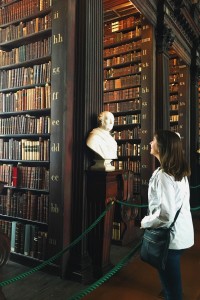 shockingly green, stunningly beautiful rolling hills and the cloudy gray skies created a beautiful color palette against which to appreciate the culture. I remember it vividly; recalling these hues also brings forth a memory of euphoric music and laughter, the trademarks of the friendly Irish people.
shockingly green, stunningly beautiful rolling hills and the cloudy gray skies created a beautiful color palette against which to appreciate the culture. I remember it vividly; recalling these hues also brings forth a memory of euphoric music and laughter, the trademarks of the friendly Irish people.
The stunning city of Oxford was filled with the most elegant buildings I had ever encountered. The entire city appeared almost as a single, sprawling castle. Everywhere we went, throughout tours, walks, and strolls, I found myself gazing upwards in awe at the grace and beauty of the colleges. I especially loved visiting the Bodleian Library. This particular collection was incredibly large and full of treasures, on display in exhibits for the public to appreciate. The original draft of Mary Shelley’s Frankenstein, the Magna Carta – all of these amazing artifacts added to my wonder. It was a massive building, more modern than the rest of the town but open and accessible to any who might wish to enter. The library to me represented Oxford well; a hub of learning for any who might wish to search for it and full of historical treasures waiting to be admired. I fell in love with the tranquility of the city and the way I felt while there, and promised myself I would return someday.
The most surprising city, London, was unlike any other European city 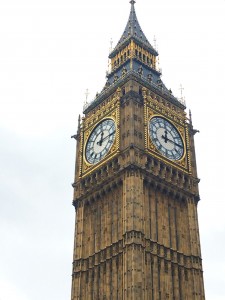 I had visited previously. Leaving Oxford behind, London was the next step into the 21st century. Bright, loud, and busy, the city was excited to be alive. Londoners walked by their world-renowned sights and symbols on their morning commutes. I stood in front of Big Ben in awe; it surprised me with its elegance. I had never spent much time examining photos of the gigantic clock, believing it to simply be nothing more than a timepiece. Now I stood irresolute, jostled by the hurrying crowd and saw for the first time the intense detail that had been placed within the monument. London is the home of so much of human culture. We had the astonishing opportunity to visit both West End and the Globe Theatre. Attending those performances of The Phantom of the Opera, Les Misérables, and Macbeth were experiences I will treasure for the rest of my life.
I had visited previously. Leaving Oxford behind, London was the next step into the 21st century. Bright, loud, and busy, the city was excited to be alive. Londoners walked by their world-renowned sights and symbols on their morning commutes. I stood in front of Big Ben in awe; it surprised me with its elegance. I had never spent much time examining photos of the gigantic clock, believing it to simply be nothing more than a timepiece. Now I stood irresolute, jostled by the hurrying crowd and saw for the first time the intense detail that had been placed within the monument. London is the home of so much of human culture. We had the astonishing opportunity to visit both West End and the Globe Theatre. Attending those performances of The Phantom of the Opera, Les Misérables, and Macbeth were experiences I will treasure for the rest of my life.
Paris is unique to itself, and I believe that is why so many, myself included, feel their hearts pine for it. It is full of beauty, romance, history, and literature, but it is a living city, and reflects this in its dirty metro stations and streets. The Eiffel Tower is famous, but I was more interested in la Cathedral de Notre D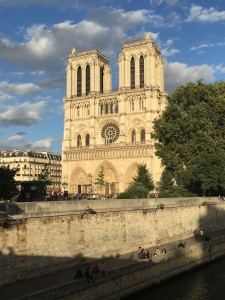 ame – the Church of Our Lady, sitting in the heart of the Left Bank. I sat for a long time in front of the church. The sun was setting, and it was bathed in orange light. The crowds were thinning, and the people were quiet as they began to consider dinner plans and their evening activities. I quietly examined each arch and window of the façade, looking at each carved face and wicked grinning gargoyle. I imagined a small silhouette reaching up to ring the bells, and felt literature come to life. I focused so intently on the architecture, without a camera or distraction of any kind. It evoked in me a sense of peace and a sense of loss, on my final evening in the city. The church was serene, overlooking the Seine with the patience of ages and looking down on tiny me with the same tranquility. I stood, vowed to return as soon as I could, and walked back along the winding streets in the twilight.
ame – the Church of Our Lady, sitting in the heart of the Left Bank. I sat for a long time in front of the church. The sun was setting, and it was bathed in orange light. The crowds were thinning, and the people were quiet as they began to consider dinner plans and their evening activities. I quietly examined each arch and window of the façade, looking at each carved face and wicked grinning gargoyle. I imagined a small silhouette reaching up to ring the bells, and felt literature come to life. I focused so intently on the architecture, without a camera or distraction of any kind. It evoked in me a sense of peace and a sense of loss, on my final evening in the city. The church was serene, overlooking the Seine with the patience of ages and looking down on tiny me with the same tranquility. I stood, vowed to return as soon as I could, and walked back along the winding streets in the twilight.
The world is both bigger and smaller than it seems to one looking out at it from their own window at home, and this paradoxical state seemed to be in constant flux for me as I traveled. I walked streets that were filled with people just like me. I felt as though the world was not truly as alien and mysterious as it sometimes seems from far away. I felt confident in the knowledge that though this place was new and on the other side of the world, it was really no different than the small quiet streets of my suburban home in Oregon. This illusion was displaced nearly as quickly as it formed, however, as I gazed in awe upon buildings older than I could fathom and landmarks both huge and beautiful. This incredible adventure was meaningful beyond all expression, and I am forever grateful to everyone who made it possible. I have been changed for the better in so many ways by my experiences abroad. I will cherish my love for these places forever, and hope someday to see them again.
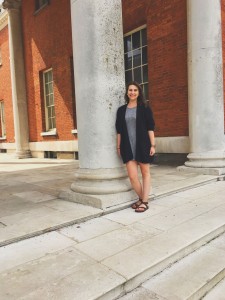
 Harry Potter, Hermione Granger, and Ron Weasley. They were my friends and they were my heroes. J.K. Rowling’s novels were some of the first fantasy books I read on my own and were one of the main series that made me fall in love with literature, and fantasy in particular. Imagine then my delight when I discovered an entire program based on fantasy and in the United Kingdom to boot. Eleven months later, I was touching down for the first time in London, England!
Harry Potter, Hermione Granger, and Ron Weasley. They were my friends and they were my heroes. J.K. Rowling’s novels were some of the first fantasy books I read on my own and were one of the main series that made me fall in love with literature, and fantasy in particular. Imagine then my delight when I discovered an entire program based on fantasy and in the United Kingdom to boot. Eleven months later, I was touching down for the first time in London, England!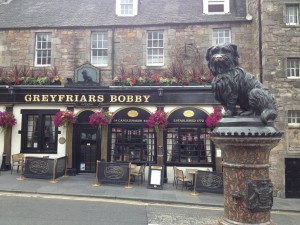 places on what seemed like every corner. This harmony between familiar and unfamiliar was one of my favorite parts about the program, finding the things that I recognized but which had a different role in the United Kingdom.
places on what seemed like every corner. This harmony between familiar and unfamiliar was one of my favorite parts about the program, finding the things that I recognized but which had a different role in the United Kingdom.